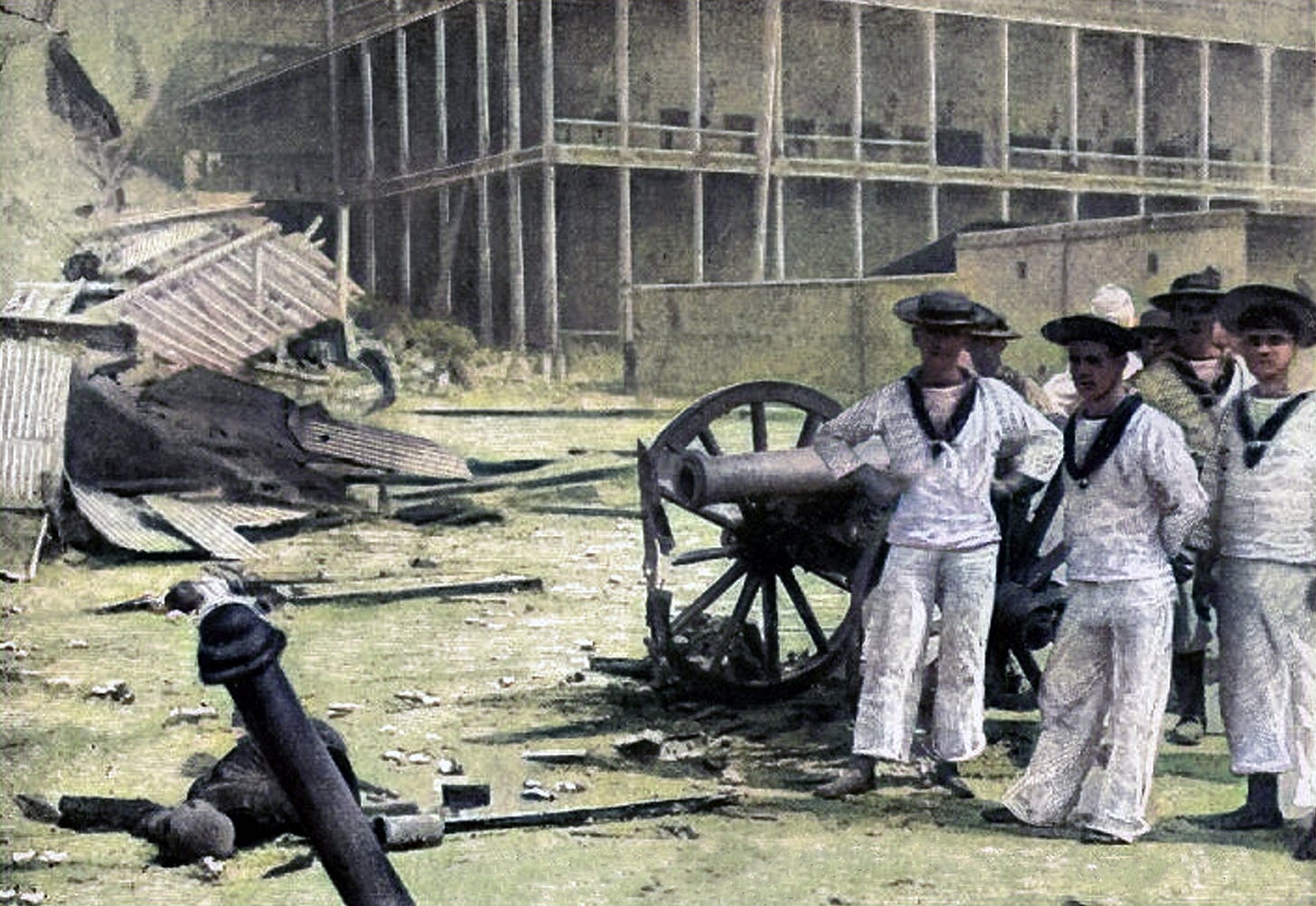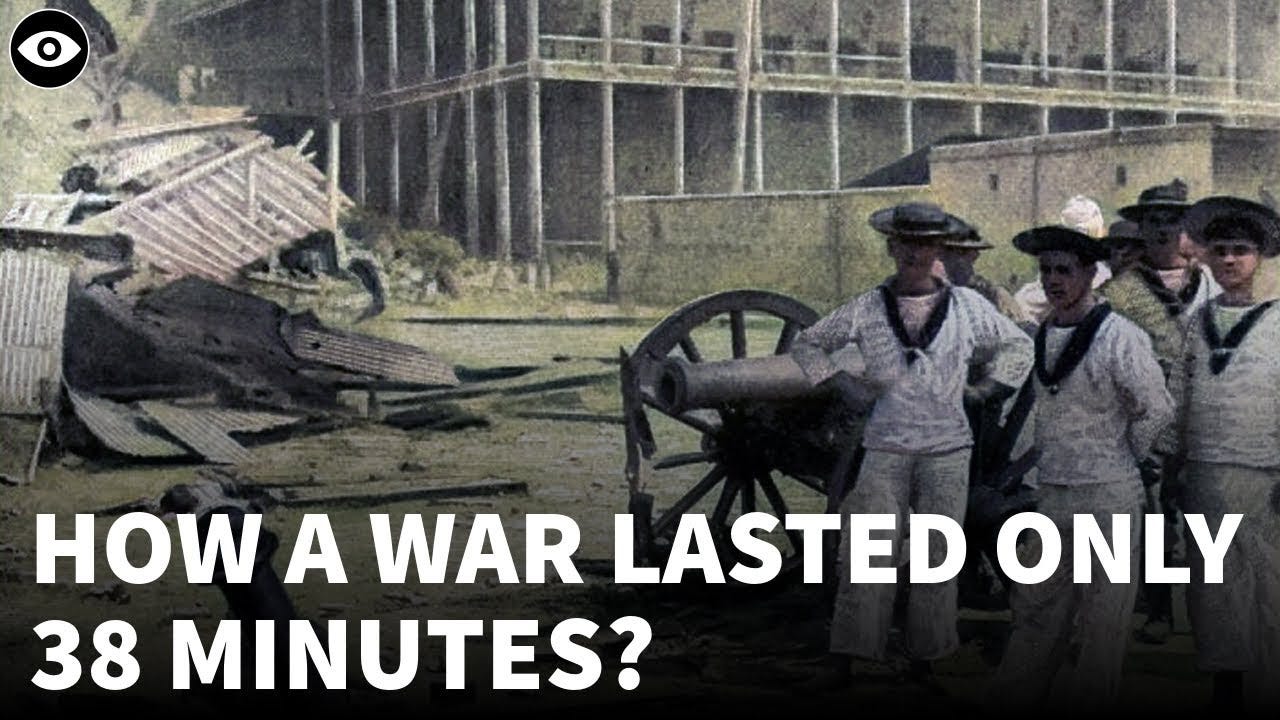World's Shortest War: How Britain Defeated Zanzibar in Just 38 Minutes (Unbelievable History)
History is replete with conflicts that spanned decades, generations, even centuries. Wars shape nations, redraw maps, and leave indelible marks on collective memory. Yet, nestled within the annals of military history lies an anomaly, a conflict so brief it sounds almost fictional: the Anglo-Zanzibar War of 1896. Lasting a mere 38 minutes, it holds the Guinness World Record for the shortest war in recorded history. But behind this seemingly absurd statistic lies a potent story of late 19th-century imperialism, technological disparity, and the brutal realities of gunboat diplomacy.
To dismiss this event as a mere historical footnote or a quirky piece of trivia is to miss its profound significance. The Anglo-Zanzibar War, despite its brevity, serves as a stark microcosm of the broader power dynamics shaping the world during the height of European colonial expansion. It reveals, with brutal efficiency, the consequences of defying an imperial power armed with overwhelming technological superiority and unwavering geopolitical resolve.
Setting the Stage: The Scramble for Influence in East Africa
By the late 19th century, the Sultanate of Zanzibar, an island archipelago off the coast of modern-day Tanzania, held a precarious position. Once a powerful Omani Arab trading empire controlling vast swathes of the East African coast and deeply involved in the lucrative (and notorious) slave and ivory trades, its autonomy was steadily eroding under increasing European pressure. Britain, in particular, had developed significant interests in the region. Zanzibar was a crucial strategic location along trade routes to India, and Britain was keen to suppress the slave trade, partly for humanitarian reasons but also to disrupt competitors' economic activities and consolidate its own influence.
The infamous Scramble for Africa was well underway, with European powers carving up the continent into spheres of influence. The 1890 Heligoland-Zanzibar Treaty between Britain and Germany formalized this process in East Africa. Germany recognised British dominance over Zanzibar and Pemba in exchange for control of the Heligoland archipelago in the North Sea. This treaty effectively turned Zanzibar into a British protectorate, stripping it of genuine sovereignty while maintaining the facade of rule by the Sultan.
The late 19th century witnessed a dramatic acceleration of European colonial expansion, driven by economic ambitions, nationalist rivalries, and a belief in cultural and technological superiority. Zanzibar found itself directly in the path of British imperial designs, its strategic value far outweighing its capacity for independent resistance.
Britain exercised its control through a system of advisors and by carefully managing the line of succession to the Sultanate. Sultan Hamad bin Thuwaini, who had ruled since 1893, was seen as amenable to British interests. His reign, however, was cut short by his sudden death on August 25, 1896 – under circumstances some historians still view with suspicion, though concrete evidence of foul play remains elusive.
The Spark: A Succession Crisis and an Imperial Ultimatum
Sultan Hamad's death created an immediate power vacuum. Within hours, his cousin, Khalid bin Barghash, seized the Sultan's palace, declared himself the new Sultan, and began rallying supporters. This move was a direct challenge to British authority. Khalid was known to be less pliable than his predecessor and potentially more inclined towards asserting Zanzibari independence, or at least resisting British directives. More importantly, he had occupied the palace and claimed the throne *without British consent*, a violation of the implicit (and increasingly explicit) terms of the protectorate agreement.
The principal British diplomat on the scene, Consul Basil Cave, acted swiftly. He deemed Khalid's ascension illegitimate and dangerous to British interests. London backed Cave's assessment. The British preferred Hamoud bin Mohammed, another relative of the late Sultan, who was perceived as far more reliably pro-British. Cave issued a series of stern warnings to Khalid, demanding that he stand down, dismiss his troops, and leave the palace.
Khalid, perhaps misjudging British resolve or hoping for external support (which never materialized), refused. He barricaded himself inside the wooden palace complex with approximately 2,800 loyalists, albeit poorly armed compared to the forces Britain could muster. His defenses included several old cannons, machine guns, and the Sultan's modest royal yacht, the HHS Glasgow, which was anchored in the harbour – ironically, a vessel gifted to a previous Sultan by Queen Victoria.
Basil Cave, receiving authorisation from the Foreign Office in London, delivered a final ultimatum: vacate the palace by 9:00 AM local time on August 27, 1896, or face bombardment. The stage was set for a confrontation rooted not merely in a succession dispute, but in the fundamental question of who truly held power in Zanzibar.
The 38 Minutes of Fury: Overwhelming Force Unleashed
As the deadline approached, five Royal Navy warships sat menacingly in Zanzibar harbour: HMS Philomel, HMS Thrush, HMS Sparrow, HMS Racoon, and the flagship HMS St George. They represented the cutting edge of naval technology at the time, armed with modern artillery capable of delivering devastating firepower.
Khalid bin Barghash apparently believed the British were bluffing. He failed to grasp the scale of the destructive power arrayed against him or the determination of the British Empire to enforce its will. At precisely 9:02 AM, as the ultimatum expired, Rear-Admiral Harry Rawson gave the order to commence firing.
The bombardment was swift, brutal, and utterly one-sided. The Royal Navy cruisers unleashed a torrent of high-explosive shells onto the Sultan's wooden palace. The Zanzibari cannons returned fire sporadically, but their antiquated ordnance was largely ineffective against the armoured British ships. The HHS Glasgow attempted to engage the British fleet but was quickly sunk by return fire. Within minutes, the palace complex was engulfed in flames, its structure collapsing under the relentless barrage. Chaos erupted within the palace grounds as Khalid's forces suffered heavy casualties.
To gain a clearer visual understanding of the forces involved and the swiftness of the action, this video provides a concise overview:
By 9:40 AM, just 38 minutes after the first shot was fired, the bombardment ceased. The Sultan's flag flying over the palace was shot down, the palace itself was a burning ruin, and Zanzibari resistance had utterly collapsed. Around 500 of Khalid's defenders were killed or wounded. On the British side, only one sailor aboard HMS Thrush was slightly injured. The asymmetry was staggering.
Aftermath and Implications: Cementing British Control
Seeing the hopelessness of his situation, Khalid bin Barghash fled the devastated palace and sought refuge in the German consulate. Under the rules of diplomatic immunity, the British could not forcibly remove him. This created a minor diplomatic inconvenience, but his claim to the throne was effectively nullified. He was later smuggled out to German East Africa (mainland Tanganyika) and lived in exile. The British swiftly installed their preferred candidate, Hamoud bin Mohammed, as Sultan. His first act, under British pressure, was to abolish the legal status of slavery in Zanzibar – a long-standing British goal finally achieved through direct intervention.
The Anglo-Zanzibar War, despite its comical brevity, had profound consequences. It demonstrated unequivocally the impotence of local rulers who dared to defy British imperial authority, particularly when faced with the Royal Navy. It solidified British control over Zanzibar, transforming the protectorate into a colony in all but name. The Sultanate would continue to exist, but its rulers served largely at the pleasure of the British Crown until Zanzibar gained independence in 1963.
The war served as a chilling example of realpolitik in the colonial era. British actions were guided not by abstract principles of justice or legitimacy, but by strategic interests and the maintenance of imperial prestige. The swift, overwhelming use of force sent a clear message to other potential challengers across the Empire.
Why So Short? Deconstructing the "Unbelievable"
Several factors contributed to the war's extraordinarily short duration:
Technological Disparity: This was the most critical factor. Modern, steel-hulled warships with powerful, accurate artillery faced a crumbling wooden palace defended by antiquated cannons and poorly trained troops. It was less a battle and more a demolition exercise.
British Preparedness and Resolve: The Royal Navy was prepared for action and had clear orders. Basil Cave and Admiral Rawson did not hesitate once the ultimatum expired. There was no protracted negotiation or wavering resolve.
Khalid's Miscalculation: Sultan Khalid fatally underestimated British determination and the effectiveness of their naval power. He lacked the military means, strategic depth, or external allies to mount a meaningful resistance.
Limited Objectives: The British objective was specific and limited: remove Khalid and install Hamoud. They weren't seeking protracted conquest, merely regime change to ensure compliance. Once the palace, the symbol and centre of Khalid's power, was destroyed, the objective was achieved.
Localized Conflict: The fighting was confined almost entirely to the palace area and the immediate harbour. It didn't escalate into a wider uprising or guerrilla war.
Legacy and Reflection: More Than Just a Historical Footnote
The 38-minute war is often remembered with a degree of amusement, but its legacy is far more complex. It stands as a stark illustration of the mechanics of late 19th-century imperialism – the assertion of dominance through overwhelming force, the disregard for local sovereignty when it conflicted with imperial interests, and the role of technology in facilitating colonial conquest. It underscores how perceived slights against imperial prestige could trigger disproportionately violent responses.
Studying the Anglo-Zanzibar War compels us to reflect on the nature of power, sovereignty, and the often-brutal history underlying contemporary global political structures. It reminds us that historical events, no matter how brief or seemingly obscure, can carry significant weight, revealing deeper truths about the eras in which they occurred and the forces that continue to shape our world.
The story of the world's shortest war is not merely about minutes and seconds; it is about the collision of empires and aspirations, the cold calculus of power, and a moment when the overwhelming might of the British Empire was unleashed with devastating, near-instantaneous effect upon a defiant Sultanate. It is a potent, albeit brief, chapter in the complex narrative of colonialism and its enduring impact.
The swift, decisive, and utterly unequal nature of the Anglo-Zanzibar War serves as a permanent, albeit minuscule, monument to the age of high imperialism, forcing us to confront the uncomfortable realities of how power, technology, and political will converged to shape the modern world in ways both grand and brutally brief.



